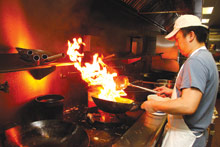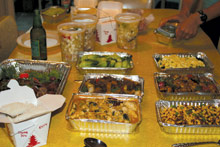
Flavor: Chinese of your choosing
Ambiance: For $1 delivery charge, your own living room
Price: Varies
Where: 48 Westgate Parkway
Contact: 236-3839
Hours: Sun-Thu, 11 a.m.-10 p.m.; Fri-Sat, 11 a.m.-10:30 p.m.
If I was a Beijinger, I probably would have munched on a Big Mac during the Olympics opening ceremonies last week, or watched the spectacle unfold on a flat-screen TV at the Outback Steakhouse adjoining Worker’s Stadium. But, as an enthralled foreigner, I was set on matching traditional Beijing cuisine to the festivities. Like the tourists who seek spaghetti in Little Italy or barbecue in Western North Carolina, I determined to get my hands on a Peking Duck—current trends (and geography) be damned.
Honestly, my fantasy seemed as unlikely as the games ending without a doping scandal. Buncombe County isn’t exactly known for its authentic Chinese cookery. Its most popular Chinese restaurants are, at best, Chinese-esque, featuring gargantuan buffets of easily identified Chinese, Japanese and American standards, most of them fried. Patrons at such places tend to spritz their piled-high plates with a creamy dressing made from ketchup, mayonnaise, sugar, and, sometimes, a hint of ginger, added to make an exotic condiment out of a sauce most American fast food joints would smear on a burger.
“It hooks people in,” a baffled staffer at one of Asheville’s busiest Asian-style eateries once told me. “They love that white sauce.”
Still, all the white sauce in the world does not a real Chinese culinary experience make. Chinese cuisine is widely considered one of the richest edible traditions anywhere, and the Shandong style—the heading under which Beijing food falls—is the style that spawned it all.
Although a few Shandong dishes—notably roast pork and hot-and-sour soup—would be familiar to American buffet-goers, the majority of foods associated with Beijing would likely be shooed away by most cream-cheese wonton loyalists. Unlike southern Chinese cooking, which makes extensive use of vegetables, the eastern coastal Shandong style relies heavily on vinegar, seafood, small grains, peanuts and corn: Think millet pancakes, pickled cabbage and five-spice fish.
I didn’t know any of this when I decided to serve a Beijing feast on 8/8/08 to accompany coverage of the Olympics kick-off. But I suspected I couldn’t just march into a Chinese restaurant waving a picture of Michael Phelps and expect a plate of Beijing shrimp chips to appear. So I combed the Internet for help, finally landing on a page with luscious photos of Beijing specialties, accompanied by their descriptions in English and names written in Chinese characters, with phonetic pronunciations. Bingo (‘bin-(,)go).
I’m a great believer in the written word: Armed with the names of Beijing dishes, written in Chinese, I felt confident I’d be eating traditional Beijing food come Friday night.
(This technique, I should add, had failed me before: I once toted a handwritten Arabic note to Egypt that a friend of a friend assured me would help procure authentic native dishes. I dutifully handed my note to every waiter and vendor I encountered and was served—much to my intense dismay—hamburgers, french fries and Cokes. Turns out my note didn’t read “Bring me what you like,” as my Arabic-speaking acquaintance had promised. Instead it read: “Bring me what I like,” leaving it up to the reader to figure out what an Ugly American might prefer.)

I decided to take my three-page printout of Beijing delicacies to Oriental Pavilion, the Chinese restaurant in the Westgate Shopping Center, which has long impressed me with what seems an unusual attention to detail. Although I’ve had meals there that fell a good deal short of the mark, the kitchen has produced enough unexpected flourishes and perfectly cooked proteins to make me think its chefs were capable of working off the menu. That, and the small red print on the restaurant’s take-out menu indicating they could make “unlisted dishes.”
After determining I didn’t want the restaurant to cater a banquet or office party, the man working the cash register at Oriental Pavilion summoned the chef to review my list of requests: Gong bao ji ding. Hao yu niu liu. Zi ran yang rou. Soon, another staffer emerged from the kitchen, and a loud Chinese debate concerning the dishes (I’m guessing here) ensued. How many meat dishes did I need, the cashier—who appeared to be the only English speaker among them—asked me. How many vegetable? What if there were bones in my fish? Could I eat spices?
It was decided, the cashier said, that I must have white rice and quarts of tofu-seafood soup along with my four meat and four vegetarian dishes. “This is the Chinese way,” he explained, pantomiming eating at a crowded table. The chef nixed the lamb dishes, calling them wintertime food. “Those are not very good,” the cashier added. A few beef dishes were briefly contemplated before the chef deemed them too similar in flavor to the chicken dish already approved.
The trio of employees finally settled on a menu, one the cashier said “had good energy.” Before I left, the chef excitedly showed me an empty disposable pan. “For the Peking duck,” the cashier said, nodding as another employee told him something. “She says maybe you’ll tell people we make authentic Chinese food.”
Consider yourself told. Oriental Pavilion, which I’ve since learned is helmed by chef-owners Bao Guo Wang and Zhao Chang, makes authentic Chinese food and makes it remarkably well. A few of the dishes we sampled were phenomenal, including the flavor-packed Peking duck, irresistibly garnished with a carrot sculpted into a flower.
The duck, with its thick, salty skin, was a dark-meat lovers’ dream. As tradition dictates, the restaurant provided thinly sliced cucumber, squash and hoisin sauce with which to dress the garlicky meat before wrapping it in thin flour pancakes. The entire spread was polished off before the March of Nations began.
Also outstanding was the shui zu yu, a whole-fish dish, embodying the reminder that Chinese sauces aren’t all just pan drippings and corn starch. The fish was submerged in a tangy, pepper-spiked sauce that had clear overtones of lemon and butter. While the fish was a mite greasy, the sauce was too good not to gobble up.
Perhaps the best dishes came from the vegetarian column. The sung yen ru mi, featuring al dente cooked corn and earthy pine nuts, was a wonderfully rustic counterpoint to the highly spiced entrées on the table. But the gold-medal item was the bo cai chao ji dan, a savory braised-spinach and scrambled-egg concoction. The spinach was wonderfully fresh and—combined with the eggs—terrifically satisfying.
The Olympics, of course, are nearly over. But local residents can certainly find some solace in knowing authentic, traditional Chinese food will still be available in West Asheville.



Before you comment
The comments section is here to provide a platform for civil dialogue on the issues we face together as a local community. Xpress is committed to offering this platform for all voices, but when the tone of the discussion gets nasty or strays off topic, we believe many people choose not to participate. Xpress editors are determined to moderate comments to ensure a constructive interchange is maintained. All comments judged not to be in keeping with the spirit of civil discourse will be removed and repeat violators will be banned. See here for our terms of service. Thank you for being part of this effort to promote respectful discussion.